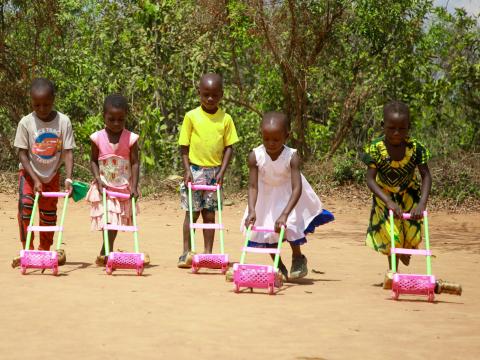Community literacy centres support children's brain development

It’s a sweltering morning in Kalongo in Nakasongola district. We brave a bumpy car ride on a dusty winding road to Mukama Mulungi Literacy Centre, one of 27 community literacy centres established in Nakasongola with the support of World Vision. Here, the joyful sounds of children singing from the grass-thatched mud-and-wattle structure welcome us.
Inside the makeshift structure, the ambience is as sparkling as it is animated. Embellished bright coloured manila cardboards of different shapes sway as if dancing to the beautiful melodies from the young voices. Some cardboards have letters and numbers inscribed on them. Others have pictures and names of animals and objects common in this community. In one of the corners, there are heaps of children's books and playing materials, including balls and puppets.
The rich, colourful classroom uses locally available materials like banana fibres, sisals, polythene bags, plastic bottles, bottle tops, wood, boxes, paper, and glue. The entire artwork is a handiwork of World Vision-trained parents and teachers in assessing and strengthening classroom learning environments and systems. World Vision provided rubbers, markers, charts and polythene paper for covering the finished learning materials from dust and for longer shelf life.

When the COVID-19 pandemic hit, Uganda imposed one of the most prolonged school shutdowns globally, closing schools for almost two years. During that time, World Vision working with supporters, stakeholders, families, and communities, established 27 community literacy centres in Nakasongola district, including Mukama Mulungi Community Literacy Centre.
Working with parents and caregivers as first educators, World Vision provided each centre with two trained teachers or facilitators to support learning activities. Parents met every month to discuss the progress and address emerging needs, including developing learning and playing materials for their children.

For Thomas, Mukama Mulungi Literacy Centre is located nearly a half kilometre from his home. He would regularly attend the centre for three hours to learn and play with friends every Saturday. "Our school was closed because of COVID-19, and we were not learning. I felt happy coming here every Saturday to learn and play football with my friends. I learnt to sing, read and even write letters. Today, I can count up to 100! When I would go back home, I would teach my younger sisters to spell words."
Hillary Barugahare, Education Project Officer for World Vision, says the COVID-19 pandemic exposed existing inequalities that the most vulnerable children and their families suffer. As soon as the World Health Organisation (WHO) declared COVID-19 a pandemic, World Vision responded with a focus on the greatest threats to children.
“Education couldn’t wait for us”, says Barugahare. "We learnt to focus on fewer priorities that make the biggest difference in the life of the most vulnerable children—empowering parents with the tools and training them to give their children the opportunity to shine."
Jimmy is a parent and a facilitator at Mukama Mulungi Literacy Centre. He says that when the Government closed schools to mitigate the spread of COVID-19, interrupting the learning of more than 5 million learners in Uganda, his concern was how to keep the children in his community constructively engaged for an uncertain period.
“We would just hear that children in towns were learning through radio, television, and the internet, but such things were not feasible here", Jimmy says. "Community literacy centres are like lubricants that kept our children sharp and steady throughout the lockdown period. I’m glad World Vision responded before the brains of our children became rusty!”

Christine facilitates with Jimmy at Mukama Mulungi Community Literacy Centre. She says COVID-19 caused many unexpected consequences with far-reaching impacts, such as trauma, psychosocial distress, school dropouts, anxiety, and teenage pregnancy. “When World Vision presented the opportunity to work together, I saw a chance to help children in my community, especially during such an unprecedented pandemic. I became a teacher volunteer immediately without a second thought."
Like Thomas, Immaculate is fond of the literacy centre, and she cannot let go of the great memories. "I always looked forward to Saturdays. These were so special. I would make sure I completed my chores in advance because Saturdays were for learning and meeting my friends. I didn't know colours' names, but now I know. I can identify them", she says.
John Tereraho, Education Technical Lead for World Vision, says the organisation was able to successfully implement its programmes, including education interventions, mainly because of the adoption of a household engagement and accountability approach before the outbreak of the pandemic.
"The household cluster was very key to our success. It would have been nearly impossible to implement any activities if we didn't have families clustered and parents tooled and trained to support reading activities in communities", he says. By design, the household cluster approach brings together households to identify and address issues affecting them. Specially trained Trainers-of-Trainers reside within the communities and therefore they do not require any facilitation.
To date, World Vision has supported the establishment of 435 community literacy centres in 24 districts across the country where it implements education interventions.
Tereraho says the current strategy focuses on working with parents as first educators to support early reading and numeracy. "We will continue working with communities, particularly parents and caregivers, to support existing community literacy centres and to establish more in all communities where we have education programming,” he says.
-
Story by Mary Atuheire - Donor Liaison Officer. Photos by Clive Polycarp Inyhensico - Graphic Designer.